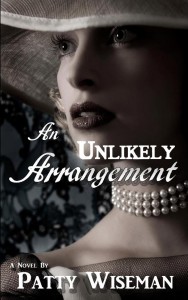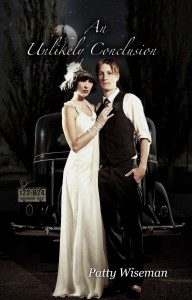 Today’s guest is Patty Wiseman, a lifetime member of the Worldwide Who’s Who for Professional Women and the author of historical romances. Twice she has won first place in romance with the Texas Association of Authors. Here’s some important advice from Patty on setting.
Today’s guest is Patty Wiseman, a lifetime member of the Worldwide Who’s Who for Professional Women and the author of historical romances. Twice she has won first place in romance with the Texas Association of Authors. Here’s some important advice from Patty on setting.
SETTING IS THE MAGIC
I cannot emphasize enough how important setting is in your novel. It’s what makes a book cinematic, fuels the imagination, makes a scene turn into Technicolor in the reader’s mind and become vibrant and alive. My series is set in the 1920’s and I spent a lot of time researching the era. I wanted to get it right, bring the reader into my world.
There are certain elements of setting which you must implement in your writing to bring the story to life.
- Period – What era are you writing in? In this element you need to remember the physical, sensuous world. Their clothes, hairstyles, food, transportation, buildings, the sounds, the smells, etc. Make sure you get it right, put your reader in the story by getting the time period correct.
- Time Span – What time frame does your story cover? Does it span a few days, weeks, or years? This needs to be clear to the reader. Take care of your transitions in time, eliminate the confusion. If it spans years, you may want to check facts. Things are invented or become obsolete. Make sure the automobile was actually invented by that time for example.
- Location – World building is important, whether you are putting the scene in a known location or building a new world. For each scene set the lstage for your reader. It can be a subtle nuance, or a prominent building, but always let the reader ‘see’ where the scene takes place.
- conflict
 – Your protagonist must have a struggle, some kind of obstacle to overcome. Keep this in mind when creating your setting.
– Your protagonist must have a struggle, some kind of obstacle to overcome. Keep this in mind when creating your setting.
- If your character has an inner struggle, you have many choices to allow this scene to play out. In his study, on the beach alone, in a quiet forest, even walking down a busy street lost in thought. Put your reader there.
- If it is a personal conflict with friends or family, create a setting where this would logically happen. At a family gathering, reading the will, family game night, out with friends, etc. Put your reader there.
- If your main character is fighting society as a whole, a belief het wrap his mind around, standing his ground for something he believes, fighting for good against evil, setting is very important. It must be believable, and time relevant.
To produce the setting for my “Jazz Age” series, I leaned on the stories I heard as a girl as my grandparents recounted the stories. I listened to the language, the descriptions, etc. Those images were imbedded in my mind.
The voice of the characters came naturally. However, as I continued, it was clear I would have to do more research. Ancestry.com, books on the ‘roaring twenties’, friends I made in Detroit, Mi., and articles on the internet about the era helped to broaden my ‘feel’ for the time.
Immigration was very active during this time frame, so I researched where my characters immigrated from. I adopted mannerisms, customs, etiquette, and language that would be relevant to those characters. Sometimes we forget to round out our characters by investigating their past. This is important, for it gives your character credibility. Their past can make a big impact in the setting of your story; make them stand out as real, viable people.
My hope is that we make our characters believable by adopting all aspects of their personality and how their background molded them into the people we see in the story.
all aspects of their personality and how their background molded them into the people we see in the story.
In my last book of the series, An Unlikely Conclusion, I ended up doing more research than the other two because of a train wreck I made the focal point in the story. As I researched the train, I felt myself taken back to a time and place long gone.
Immerse yourself in your story. Your readers won’t be disappointed you took the time and trouble to create the magic.
JIM: Check out all of Patty’s books at: http://amzn.to/1x9BhqA
- And leave a comment if you can. Even a two word comment would be appreciated. Thanks.

Your reminders are pertinent and valuable. My stories are set in Kansas City and include visits to other places in the world. I visit the locations and take notes about the sights, sounds, smells, etc. Writing historical fiction must be much harder since you can’t visit your places as they were at that time. Congratulations on An Unlikely Conclusion.
Thanks so much, Joyce! I appreciate the fact that you take the time to get your setting correct, even in contemporary that’s important. Reading should spark the imagination and setting helps to do that. I don’t think historical is so much harder, just the time to research it properly. Believe me, readers appreciate accuracy!
Great post. Creating a setting, being careful to include customs, clothing, language, of the specific time adds a lot to the reader’s enjoyment of the story. In my current WIP, set during WWII, I made an effort to add many details ‘of the times’ including rationing, clothing, volunteering, victory gardens, and some WW events along the California coast that many are unaware of. thanks for sharing your insights. Creating a fictional town eliminates issues of structural or ‘correct time frame’ elements to the town. Our book has a fictional town, but set in a familiar location, along the No. California coastline.
Great post. I agree. My latest WIP, set during WWII has a good deal of ‘setting, customs, fashion, rationing, and a few West Coast WWII events seldom known by most of us.’ A good deal of setting and customs can add considerably to the plot and is a reason many folks like to read stories in other than current time settings. Creating a fictional town can eliminate the problems of getting the landmarks wrong either during the era or structurally, so we create towns but in familiar ‘locations’.
Yes, Elaine, a good setting brings the reader into the story. It sets the scene in their mind and makes the story that much more enjoyable. Give me a story I can travel to in my mind any day! I guess that’s why I enjoy historical so much. It puts me there and I can ‘see’ the story so much better. Thanks for the comment!
Patty, I agree setting is vastly underated in its importance. It’s the stage we move our characters around on and readers look to its authenticity. It’s one reason I keep English email contacts for questions that arise in my mysteries. Believe me, if I have a character taking a walk on a certain Oxford street and he gets to his destination in three minutes when that trip is over a mile and half, I’ll get an email about it! Setting also affects the cultural overtones of the day that affect your plot, and it adds texture to any novel regardless of genre, if your reader can place your characters there in his mind.
I absolutely agree, Marni! I have actually had ‘those that know’ comment during ‘Beta’ stage. I think it makes you much more conscientious going forward. Thanks for your great comment!
I so admire authors like Patty, who have the patience it takes to do all that research for a historical story. She makes valid points. Setting is always important, but more so in the historical stories…at least in contemporary pieces, an author can make something up and never be called out on it. If you’re writing about history, every single detail must be right…there are those readers out there who will check your info!!
Thanks for featuring Patty and her books today, Jim. They are not only interesting, but educational, as well. She gives us a glimpse into the past.
Thanks, Ann. It was my pleasure to have Patty Wiseman on this week. And thank you for the nice comment.
Thanks Ann! I really appreciate those remarks. 🙂
I always enjoy reading any story set in a time or place I would like to visit. I especially like reading novels set in 1700 in Europe. The customs and attitude make a story for me. Looking forward to reading An Unlikely Conclusion.
Same here Gayland! Nothing takes me away like a good historical novel. I hope you like An Unlikely Conclusion. 🙂
Of course, I didn’t get the spelling on your name right. Sorry Galand. My fingers get ahead of my mind sometimes. 🙂
Appreciated all the pointers you included, Patty. I too place the characters of my fiction in a historical setting and enjoy the time spent immersing myself in a past era of our American history.
Thank you for your comment, Gay! Writing historical fiction can be a challenge sometimes, but what fun to go back in time and learn what it was like to live in an era gone by!